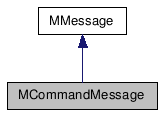Detailed Description
Helper class to handle MEL output.
This class is used to register for a callback for when certain MEL command related messages are generated.
The add callback method returns an id which is used to remove the callback.
To remove a callback use MMessage::removeCallback.
All callbacks that are registered by a plug-in must be removed by that plug-in when it is unloaded. Failure to do so will result in a fatal error.
- Note:
- Setting up a callback using the addCommandCallback() method may degrade the performance of Maya since the installed callback will be invoked repeatedly as MEL operations are processed.
#include <MCommandMessage.h>

Public Types |
|
| enum | MessageType
{ kHistory, kDisplay, kInfo, kWarning, kError, kResult, kStackTrace } |
|
Types of output messages. More... |
|
| typedef void(* | MMessageFunction )(const MString &message, MCommandMessage::MessageType messageType, void *clientData) |
| Pointer to a message function. |
|
| typedef void(* | MMessageFilterFunction )(const MString &message, MCommandMessage::MessageType messageType, bool &filterOutput, void *clientData) |
| Pointer to a message filter function.
|
|
Static Public Member Functions |
|
| static MCallbackId | addCommandCallback (MMessage::MStringFunction func, void *clientData=NULL, MStatus *ReturnStatus=NULL) |
| This method registers a callback for command
messages that are issued every time a MEL command is executed.
|
|
| static MCallbackId | addCommandOutputCallback (MCommandMessage::MMessageFunction func, void *clientData=NULL, MStatus *ReturnStatus=NULL) |
| This method registers a callback for
whenever MEL commands generate output such as that which is printed
into the command window. |
|
| static MCallbackId | addCommandOutputFilterCallback (MCommandMessage::MMessageFilterFunction func, void *clientData=NULL, MStatus *ReturnStatus=NULL) |
| This method registers a callback for
whenever MEL commands generate output such as that which is printed
into the command window. |
|
| static const char * | className () |
| Returns the name of this class. |
|
Member Typedef Documentation
| typedef void(* MMessageFunction)(const MString &message, MCommandMessage::MessageType messageType, void *clientData) |
Pointer to a message function.
- Parameters:
-
[in] message The command that was executed. [in] messageType The type of message. [in,out] clientData User defined data passed to the callback function.
| typedef void(* MMessageFilterFunction)(const MString &message, MCommandMessage::MessageType messageType, bool &filterOutput, void *clientData) |
Pointer to a message filter function.
- Parameters:
-
[in] message The command that was executed. [in] messageType The type of message. [out] filter Bool that causes Maya to filter this message if set to true. [in,out] clientData User defined data passed to the callback function.
Member Enumeration Documentation
| enum MessageType |
Types of output messages.
Member Function Documentation
| MCallbackId addCommandCallback | ( | MMessage::MStringFunction | func, |
| void * | clientData = NULL, |
||
| MStatus * | ReturnStatus =
NULL |
||
| ) | [static] |
This method registers a callback for command messages that are issued every time a MEL command is executed.
It is only called when actual commands are executed and not when scripts are executed.
The callback function will be passed the any client data that was provided when the callback was registered.
NOTE: Setting up a callback using this method will degrade the performance of Maya since the installed callback will be invoked repeatedly as MEL operations are processed.
- Parameters:
-
[in] func The callback function. [in] clientData User defined data that will be passed to the callback function. [out] ReturnStatus Status code.
- Returns:
- Identifier used for removing the callback.
- Status Codes:
-
- MS::kSuccess Operation succeeded
- MS::kInsufficientMemory No memory available
- MS::kFailure Error adding callback
| MCallbackId addCommandOutputCallback | ( | MCommandMessage::MMessageFunction | func, |
| void * | clientData = NULL, |
||
| MStatus * | ReturnStatus =
NULL |
||
| ) | [static] |
This method registers a callback for whenever MEL commands generate output such as that which is printed into the command window.
The callback function will be passed the any client data that was provided when the callback was registered.
- Parameters:
-
[in] func The callback function. [in] clientData User defined data that will be passed to the callback function. [out] ReturnStatus Status code.
- Returns:
- Identifier used for removing the callback.
- Status Codes:
-
- MS::kSuccess Operation succeeded
- MS::kInsufficientMemory No memory available
- MS::kFailure Error adding callback
| MCallbackId addCommandOutputFilterCallback | ( | MCommandMessage::MMessageFilterFunction | func, |
| void * | clientData = NULL, |
||
| MStatus * | ReturnStatus =
NULL |
||
| ) | [static] |
This method registers a callback for whenever MEL commands generate output such as that which is printed into the command window.
This callback includes a boolean filter option which allows the callback to prevent the output of the message to the script editor and command line output. Setting the 'filterOutput' parameter to true, inside your callback will filter the output from the script editor and command line output.
The callback function will be passed the any client data that was provided when the callback was registered.
- Parameters:
-
[in] func The callback function. [in] clientData User defined data that will be passed to the callback function. [out] ReturnStatus Status code.
- Returns:
- Identifier used for removing the callback.
- Status Codes:
-
- MS::kSuccess Operation succeeded
- MS::kInsufficientMemory No memory available
- MS::kFailure Error adding callback
| const char * className | ( | ) | [static] |
